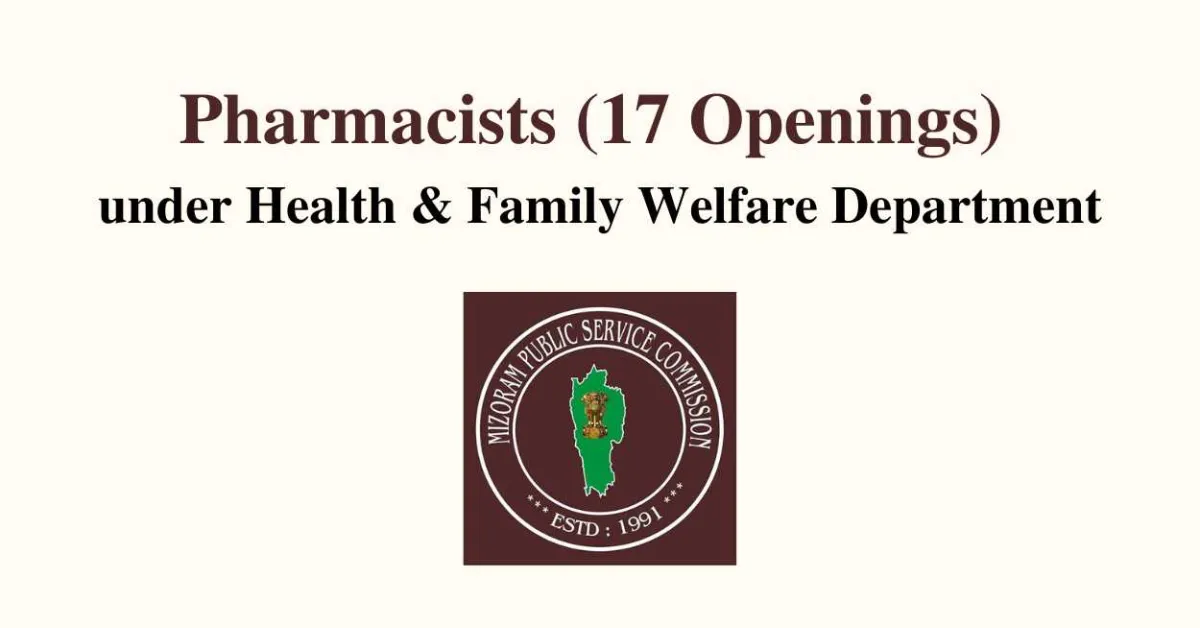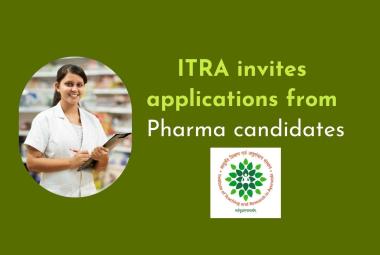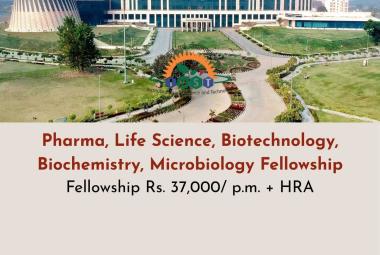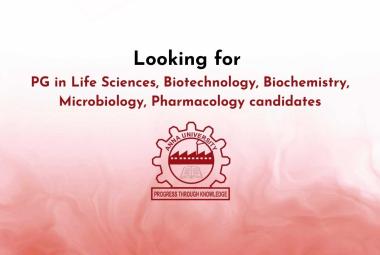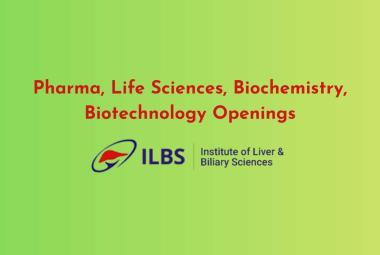Direct Recruitment Examination for the under-mentioned posts are to be conducted by the Mizoram Public Service Commission. Application can be submitted through the Mizoram Public Service Commission’s online portal mpsconline.mizoram.gov.in till 11.08.2025. An Applicant must verify that his/her application is actually submitted after payment is made, otherwise the claim of the applicants regarding his/her Candidature will not be entertained.
Post : Pharmacist (Contract)
No of posts : 17 (16+1)
1 (One) post reserved for PwBD (i.e. fully deaf and partially deaf) (Physical requirement- Seeing, walking reading and writing, communication)
Name of Department : Health & Family Welfare
Pay Level in the pay Matrix : Level 6
Education and other qualifications required : 1. HSSLC (Science) from recognized Institution.
2. Diploma in Pharmacy or above.
3. Registered Pharmacist under Mizoram State Pharmacy Council.
Common eligibility criteria :
I. Computer Proficiency : Computer Proficiency as prescribed by the Mizoram Group ‘A’, ‘B’ and ‘C’ posts Service/Recruitment (Amendment) Rules, 2023 notified vide No. A.12018/31/2020-P&AR (GSW) dated 10.03.2023.
II. Age Limit : A candidate must not be less than 18 years of age and not more than 35 years of age on the last date of application. Upper age limit relaxation will be as per Notification No.A-12011/1/2019- P&AR(GSW) dt.3.6.2019 (published in the Mizoram Gazette Extraordinary, Issue No. 375 dt.10.6.2019) and as amended from time to time. For age proof, HSLC/HSSLC Certificate which clearly shows the candidate’s date of birth shall be accepted. In the absence of date of birth in such certificates, the relevant documents issued by the competent authority may be accepted. (Click for details at https://tinyurl.com/age-relaxa )
III. Mizo Language Proficiency : A candidate must achieve a minimum score in the qualifying test of Mizo Language Proficiency as prescribed by the Government from time to time. However, a candidate who studied Mizo subject in Class-X standard(HSLC) or above within Mizoram or who opted for Mizo subject as MIL outside Mizoram is exempted from taking the qualifying test (Reference: the Mizoram Gazette Notification vide No.A-11019/1/2021-P&AR(GSW) dt.09.04.2024 issue No.247).
Disqualifications
(i) Canvassing by a candidate directly or indirectly will disqualify his/her candidature.
(ii) Particulars/Details to be mentioned in the application should be completely and correctly stated. Any application not specifying the required information of a concerned candidate shall be liable to be rejected.
(iii) Any candidate who, on verification at any stage of the recruitment process, does not fulfil any of the eligibility conditions will be disqualified.
Expulsion of Candidate
(i) Where a candidate is found guilty of misconduct or malpractice or any offence he shall be expelled and shall not be allowed to continue the examination. In such cases, the Centre Superintendent shall submit a report in the prescribed form (Appendix – XII) to the Controller of Examinations, stating in full the facts and situation accompanied by the evidence against the candidate in a sealed cover.
(ii) When a candidate is suspected of using unfair means during the Examination by the Centre Superintendent but lacking in proof of the candidate’s misdeeds to warrant expulsion, the Centre Superintendent may allow him/her to continue the examination. However, the Centre Superintendent has to make a special report enclosing the answer book and any other incriminating documents, if any, in a sealed cover to the Controller of Examinations, clearly indicating in red ink the portions wherein unfair means is suspected to have been practised.
(iii) Any candidate threatening or intimidating any Invigilator will be expelled from the examination hall/room immediately and the matter will be reported to the Controller of Examinations as well as the local police.
(iv) In the event of any contingencies arising which may call for immediate action, action will be taken against the candidate under The Mizoram Prevention of Malpractices at Examination Act, 1990 and further action will also be taken under Bharatiya Nagarik Suraksha Sanhita (BNSS), 2023.
Debarment : Candidate(s) charged under Para 29 (i) or (ii) or (iii) of Mizoram Public Service Commission (Conduct of Examinations) Guidelines, 2023 and found guilty may be debarred from appearing in any examinations/recruitment conducted by the Mizoram Public Service Commission. The Commission will maintain a record of this and the same shall be sent to Union Public Service Commission as well as other State Public Service Commissions. Candidate(s) debarred by the Union Public Service Commission and other State Public Service Commissions shall automatically be debarred by the Mizoram Public Service Commission.
Any additional information regarding this advertisement will be published on the Commission’s official website.
If payment is to be done through UPI, it may be done using only the mobile number used for one time registration. Persons with disabilities are exempted from payment of application fees.
Syllabus
1. Paper - 1 General English : 100 Marks (3 hours)
2. Paper - II General Knowledge (MCQ) : 100 Marks (2 hours)
3. Paper - III : Technical Subject (MCQ) : 200 Marks (2 hours)
4. Paper - IV : Technical Subject (MCQ) : 200 Marks (2 hours)
Total of Written Examination : 600 Marks
Personal Interview : 80 Marks
Total 680 Marks
DETAILS OF SYLLABUS :
1) Paper-I General English : 100 Marks (3 hours)
a) Precis Writing : 10 Marks
b) Letter Writing : 15 Marks
c) Comprehension of given passages : 15 Marks
d) Grammar: Parts of Speech : 20 Marks
e) Correct usage and Vocabularies : 20 Marks
f) Formation of Sentence : 20 Marks
2) Paper-II General Knowledge (MCQ) :
(a) Current events of state, national and international importance : 12 Marks
(b) History of India and Indian National Movement : 12 Marks
(c) Indian and World Geography - Physical, Social, Economic Geography of India and the World : 12 Marks
(d) Indian Policy and Governance - Constitution,
Political System, Public Policy, Duties & Rights Issues
Economic and Social Development Sustainable Development, Poverty, Inclusion, Demographics,
Social Sector initiatives, and other related issues : 12 Marks
(f) General issues on Environmental Ecology,
Bio-diversity and Climate : 12 Marks
(g) General Science The topics listed above shall cover the State of Mizoram wherever applicable. : 12 Marks
(h) General awareness on Mizo culture, its heritage and society : 16 marks
3) TECHNICAL PAPER - I (MCQ) : 200 Marks (2 hours)
Unit-I (30 marks)
a) Pharmacopoeia: Introduction to IP, BP, USP, NF and Extra Pharmacopoeia. Salient features of Indian Pharmacopoeia.
b) Packagingmaterials: Types, selection criteria, advantages and disadvantages of glass, plastic, metal, rubber as packaging materials.
c) Pharmaceutical aids: Organoleptic (Colouring, flavouring, and sweetening) agents
d) Preservatives: Definition, types with examples and uses
e) Cosmetics: Formulation and preparation of the following cosmetic preparations: lipsticks, shampoos, cold cream and vanishing cream, tooth pastes, hair dyes and sunscreens.
UNIT-II (50 marks)
a) Tablets - Coated and uncoated, various modified tablets (sustained release, extended-release, fast dissolving, multi-layered, etc.)
b) Capsules - Hard gelatin capsules, Soft gelatin capsules, manufacturing defects and quality control tests. Packing, storage and stability testing of soft gelatin capsules and their applications.
c) Liquid oral preparations - solution, syrup, elixir, emulsion, suspension, dry powder for reconstitution.
d) Topical preparations - ointments, creams, pastes, gels, liniments and lotions, suppositories, and pessaries, Nasal preparations, Ear preparations.
e) Sterile formulations - Injectables, eye drops and eye Ointments
f) Herbal cosmetics: Sources, chemical constituents, commercial preparations, therapeutic and cosmetic uses of: Aloe vera gel, Almond oil, Lavender oil, Olive oil, Rosemary oil, Sandal Wood oil.
UNIT-III (30 marks)
a) Sources and types of errors: Accuracy, precision, significant figures.
b) Impurities in Pharmaceuticals: Source and effect of impurities in Pharmacopoeia! substances, importance of limit test, Principle and procedures of Limit tests for chlorides, sulphates, iron, heavy metals and arsenic.
c) Poisoning: Types of poisoning: Clinical manifestations and Antidote.
d) Pharmacovigilance: Definition, aim and scope, Overview of Pharmacovigilance.
e) Medication errors: Definition, types, consequences, and strategies to minimize medication errors.
UNIT-IV (30 marks)
a) Pharmacy Practice Regulations 2015
b) National Pharmaceutical Pricing Authority:
Drugs Price Control Order (DPCO) - 2013. Objectives, Definitions, Sale prices of bulk drugs, Retail price of formulations, Retail price and ceiling price of scheduled formulations, Pharmaceutical Policy 2002, National List of Essential Medicines (NLEM).
c) Biomedical Waste Management Rules 2016 - Basic aspects, and aspects related to pharma manufacture to disposal of pharma / medical waste at homes, pharmacies, and hospitals.
UNIT-V (30 marks)
a) Preventive healthcare - Role of Pharmacists in the following
• Demography and Family Planning.
• Mother and child health, importance of breastfeeding, ill effects of infant milk substitutes and bottle feeding.
• Overview of Vaccines, types of immunity and immunization.
b) Effect of Environment on Health - Water pollution, importance of safe drinking water, waterborne diseases, air pollution, noise pollution, sewage and solid waste disposal, occupational illnesses, Environmental pollution due to pharmaceuticals.
c) Psychosocial Pharmacy: Drugs of misuse and abuse - psychotropics, narcotics, alcohol, tobacco products. Social Impact of these habits on social health and productivity and suicidal behaviours.
UNIT- VI (30 marks)
a) Herbs as health food: Brief introduction and therapeutic applications of: Nutraceuticals, Antioxidants, Pro-biotics, Pre-biotics, Dietary fibres, Omega- 3-fatty acids, Spirulina, Carotenoids, Soya and Garlic
b) Introduction to food safety, adulteration of foods, effects of artificial ripening, use of pesticides, genetically modified foods
c) Dietary supplements, nutraceuticals, food supplements - indications, benefits, Drug-Food Interactions.
4) TECHNICAL PAPER - II (MCQ) : 200 Marks
UNIT-I (30 marks)
1. General Pharmacology
a) Various routes of drug administration - advantages and disadvantages.
b) Drug absorption - definition, types, factors affecting drug absorption.
c) Bioavailability and the factors affecting bioavailability.
d) Drug distribution - definition, factors affecting drug distribution.
e) Biotransformation of drugs - Definition, types of biotransformation reactions, factors influencing drug metabolisms.
1) Excretion of drugs - Definition, routes of drug excretion.
g) General mechanisms of drug action and factors modifying drug action.
2. Prescription and prescription handling
a) Definition, parts of prescriptions, legality of prescriptions, prescription handling, labelling of dispensed medications (Main label, andllaiy label, pictograms), brief instructions on medication usage
b) Dispensing process, Good Dispensing Practices, dispensing errors and strategies to minimize them.
3. Medication Adherence
Definition, factors influencing non- adherence, strategies to overcome non-adherence.
UNIT-II (20 marks)
Patient counselling
a) Definition and benefits of patient counselling
b) Stages of patient counselling - Introduction, counselling content, counselling process, and closing the counselling session
c) Barriers to effective counseling - Types and strategies to overcome the barriers
d) Patient counselling points for chronic diseases/disorders - Hypertension, Diabetes, Asthma, Tuberculosis, Chronic obstructive pulmonary disease, and AIDS
e) Patient Package Inserts - Definition, importance and benefits, Scenarios of PPI use in India and other countries
f) Patient Information leaflets - Definition and uses
UNIT-III (60 marks)
Definition, classification, pharmacological actions, dose, indications, and contraindications of-
i) Drugs Acting on the Peripheral Nervous System
a) Cholinergic drugs.
b) Anti-Cholinergic drugs.
c) Adrenergic drugs.
d) Anti-adrenergic drugs.
e) Neuromuscular blocking agents.
f) Drugs used in Myasthenia gravis.
g) Local anaesthetic agents.
h) Non-Steroidal Anti-Inflammatory drugs (NSAIDs).
H) Drugs Acting on the Central Nervous System
a) General anaesthetics.
b) Hypnotics and sedatives.
c) Anti-Convulsant drugs.
d) Anti-anxiety drugs.
e) Anti-depressant drugs.
f) Anti-psychotics.
g) Nootropic agents.
h) Centrally acting muscle relaxants.
i) Opioid analgesics.
iii) Drugs Acting on the Cardiovascular System
a) Anti-hypertensive drugs.
b) Anti-anginal drugs.
c) Anti-arrhythmic drugs.
d) Drugs used in atherosclerosis and
e) Congestive heart failure.
f) Drug therapy for shock.
UNIT IV (40 marks)
i) Drugs Acting on the Kidney
a) Definition, classification, pharmacological actions, dose, indications, and contraindications of Diuretics and Anti-Diuretics
b) Hormones and Hormone Antagonists: Physiological and pathological role and clinical uses of Anti-thyroid drugs Vitamin D,Insulin,Oral hypoglycemic agent, Estrogen, Progesterone, Oxytocin .Corticosteroids
ii) Chemotherapeutic Agents: Introduction, basic principles of chemotherapy, infestations and neoplastic diseases, Classification, dose, indication and contraindications of drugs belonging to following classes:
a) Penicillins
b) Cephalosporins
c) Aminoglycosides
d) Fluoroquinolones
e) Macrolides
f) Tetracyclines
g) Sulphonamides
h) Anti-tubercular drugs
i) Anti-fungal drugs
j) Anti-viral drugs
k) Anti-amoebic agents
l) Anthelmintics
m) Anti-malarial agents
n) Anti-neoplastic agents
UNIT-V (20 marks)
Community Pharmacy Management
a) Legal requirements to set up a community pharmacy
b) Site selection requirements
c) Pharmacy designs and interiors
d) Vendor selection and ordering
e) Procurement, inventory control methods, and inventory management Financial planning and management
f) Accountancy in community pharmacy - Day book, Cash book
g) Introduction to pharmacy operation softwares - usefulness and availability
h) Customer Relation Management (CRM)
i) Audits in Pharmacies
j) SOP of Pharmacy Management
k) Introduction to Digital Health, mHealth and Online pharmacies
UNIT- VI (30 marks)
a) Introduction to BCS system of classification,
b) Basic concepts of Clinical Trials, ANDA, NDA,
c) New Drug development, New Drugs and Clinical Trials Rules, 2019.
d) Brand v/s Generic, Trade name concept,
e) Introduction to Patent Law and Intellectual Property Rights,
f) Emergency Use Authorization
Last Date : 11-08-2025
See All B.Pharm Alerts M.Pharm Alerts M.Sc Alerts Mizoram Alerts
See All Other Jobs in our Database
Subscribe to Pharmatutor Job Alerts by Email


